Meeting or Event Agreement Contract
Dear [Recipient Name]
Thank you very much for your interest shown towards _____________.
We are pleased to respond to your request with the enclosed event agreement form. Please find all the details attached. As part of your confirmation in order to guarantee your booking, please return the agreement duly signed latest by _____________.
We hope that all the below meets your requirements. Should you need any further assistance, please do not hesitate to contact us.
The __________________ is looking forward to welcoming you and your guests.
FUNCTION AGREEMENT
Date:
Time :
Number of pax:
Location:
Price Rate:
The rate is inclusive of the following:
The rate is inclusive of the following:
* Use of the Meeting Room
* 1 coffee break with light snacks
* Lunch Buffet at Seasons Restaurant
* Overhead projector (OHP)
* Flip chart with marker pens
* Pads & Pencils
* Mint candies & Bottled of mineral water on the table
* Tissue boxes on the table
* Internet access
* Internal Signage
All prices are inclusive of 10% service charge and 10% municipality fee.
Venue set-up :To be advised by the Guest
Signage to be advised by the event organizer.
General Terms and Conditions :
Please find attached.
Mode of payment: Full payment to be settled at last day of the event.
Date: _______
Signature:
General Terms and Conditions for Events
1.Applicability/ terms and conditions of the event organizer
1.1These terms and conditions shall apply to agreements allowing the use by way of hire of hotels, conference, and banquet and event rooms for the holding of events such as banquets, seminars, conferences etc. as well as to further services provided by the hotel in relation there to.
1.2No general terms and conditions of the events organiser shall apply unless this applicability is expressly confirmed by the hotel in writing.
2.Price, Payment, Setoff
2.1The agreed prices are inclusive of 10% service charge.
2.2Unless prior credit arrangements have been made with the hotel, full payment is required 2 days in advance prior to the event by cash or credit card (cheques are not accepted). If the event credit has been established, the account must be settled without deduction within 15 days as of the receipt of the invoice.
3.Withdrawal on the part for the events organizer (cancellation)
3.1The events organizer shall only be entitled to withdraw at no expense if this is agreed in writing. Otherwise, in the event of cancellation, the hotel shall be entitled to invoice an agreed rent for events rooms if it is not possible to re-let these.
3.2If sales of food and beverage have been agreed, these shall in the event of cancellation be invoiced on a pro rata basis as follows: If cancellation is notified 1day/on the same day of the event: 100 %
3.3The obligations of the events organizer to pay under 3.1 and 3.2 shall not arise if the events organizer withdraws for a reason, which the hotel is responsible for.
4.Number of participants
4.1The events organizer shall inform the hotel of the final number of participants at the latest 3 working days before the beginning of the event.
4.2If the actual number of participants is up to 10 % less than the original number booked, the actual number booked, the actual number of participants shall be invoiced. In the event of reductions above 10 %, the hotel can invoice the agreed number in the contract less 10 %.
4.3An increase of more than 5 % is subject to the consent to the hotel. In the event of an increase the actual number of participants shall form the basis for the invoicing.
5. Food, beverage and other items brought by guests
5.1 The food and beverage for events shall be provided exclusively by the hotel. Exceptions to this are subject to a written agreement. In these cases, a contribution towards the covering of overheads shall be invoiced. The events organizer shall bear the full liability for food and beverage brought by guests and shall thus release the hotel from all claims from third parties.
5.2 Decorations brought by guests shall meet the fir safety requirements under public law. The hotel shall be entitled to demand official proof of this. Because of the possibility of causing damage, the hanging and attaching of items to walls and ceilings is subject to the consent of the hotel prior consent.
5.3 All exhibition items or other items brought by the event’s organizer or by participants in the events are to be removed, together with their packaging, by the events organizer without undue delay after the end of the event.
6.Loss of or damage to items brought by guests; liability of the hotel
6.1Exhibition items, seminar, conference or other items, including personal items brought by guest will be kept in the event room/ in the hotel at the events organisers’ risk. The hotel shall be under no obligation to guard or look after these items. The hotel shall only be liable for loss, destruction or damage in cases of intent or gross negligence of the hotel.
6.2Otherwise the hotel – except in cases of intention or gross negligence of the hotel – shall only be liable if it infringes material contractual duties and limited to the respective amounts insured as under its business liability insurance.
7.Liability of the events organizer for damage
7.1The events organiser shall be liable for all damage, such as damage to the building or to the inventory, which is caused by participants in the events or visitors, employees or other third parties from his sphere or himself.
8.Miscellaneous
8.1Any amendments or supplements to this agreement shall be in written form. This also applies for the cancellation of this written form requirement.
Formal Meeting Agreement Letter
Subject: Confirmation of Meeting Agreement
Dear [Recipient Name],
This letter serves to confirm the agreement between [Your Company/Organization] and [Recipient Company/Organization] regarding the meeting scheduled on [Date] at [Time]. The meeting will take place at [Location] and will cover the topics listed in the attached agenda.
Both parties have agreed to abide by the discussed terms and to provide the necessary materials and documentation in advance. Should any adjustments be required, please inform us no later than [Deadline].
We look forward to a productive and successful meeting.
Sincerely,
[Your Name]
[Your Position]
[Your Company/Organization]
Casual Event Coordination Email
Subject: Event Coordination Confirmation
Hi [Recipient Name],
Just touching base to confirm our plans for the upcoming event on [Date] at [Location]. Everything we discussed earlier – timing, speakers, and materials – is set to go.
Let me know if there’s anything else you need from my side. Looking forward to a fun and smooth event!
Cheers,
[Your Name]
Provisional Meeting Agreement Email
Subject: Provisional Meeting Arrangement
Dear [Recipient Name],
This message serves as a provisional confirmation for the meeting on [Date] at [Time]. The agenda and participants are tentative and may be adjusted as necessary. Please review and confirm your availability.
Once finalized, a formal agreement will follow. Your feedback is appreciated to secure the arrangements.
Best regards,
[Your Name]
Preliminary Event Agreement Letter
Subject: Preliminary Event Agreement
Dear [Recipient Name],
We are pleased to initiate the preliminary agreement for the event scheduled on [Date]. The purpose of this letter is to outline initial understandings and key responsibilities of each party. A detailed plan will be provided for review and approval.
Please confirm receipt of this letter and indicate any amendments or suggestions at your earliest convenience.
Warm regards,
[Your Name]
[Your Organization]
Informal Confirmation Message
Subject: Quick Event Confirmation
Hey [Recipient Name],
Just confirming that we are good for [Event Name] on [Date] at [Location]. Let’s meet 15 minutes earlier to sort out any last-minute details.
See you there!
Thanks,
[Your Name]
Heartfelt Appreciation and Agreement Email
Subject: Event Agreement and Thanks
Dear [Recipient Name],
I want to express my sincere gratitude for your collaboration on the upcoming event on [Date]. This email confirms our agreement regarding the event schedule and responsibilities.
Your support is invaluable, and I look forward to a meaningful and successful gathering.
Warm regards,
[Your Name]
What / Why of a Meeting or Event Agreement Contract
A meeting or event agreement contract is a formal document or message that confirms arrangements between parties regarding an upcoming meeting, conference, or event. Its purpose is to:
- Ensure all participants are aware of time, date, and location.
- Outline the agenda or topics to be discussed.
- Establish responsibilities and expectations for all involved parties.
- Provide a written record to prevent misunderstandings or disputes.
Who Should Send a Meeting or Event Agreement
- Event organizers or coordinators.
- Company managers arranging business meetings.
- Team leaders confirming project discussions.
- Individuals or groups hosting personal or informal gatherings.
Whom the Letter Should Be Addressed To
- All confirmed participants of a meeting or event.
- Stakeholders involved in decision-making.
- Sponsors or partners of an event.
- Service providers or venues requiring confirmation.
When to Send a Meeting or Event Agreement
- Immediately after scheduling a meeting to confirm details.
- Following preliminary discussions or negotiations.
- When changes to timing, location, or agenda occur.
- Prior to official invitations for large-scale events.
How to Write and Send the Agreement
- Determine the purpose and key details of the meeting or event.
- Choose the appropriate tone: formal for business, casual for informal events.
- Include date, time, location, agenda, and responsibilities.
- Send via email for speed and documentation, or letter for formal agreements.
- Keep a copy for records and follow-up.
How Many Agreements Are Needed
- One per distinct meeting or event.
- Additional agreements may be required for sub-events, sessions, or special arrangements.
- Follow-up agreements if modifications are made to the original plan.
FAQ About Meeting or Event Agreement Contracts
-
Q: Is a digital message sufficient for an agreement?
A: Yes, emails are widely accepted, but formal events may require a printed or signed version. -
Q: Can the agreement be modified after sending?
A: Yes, changes can be communicated with a revised agreement or follow-up email. -
Q: What happens if a participant disagrees?
A: Clarify points in discussion or revise the agreement to reflect mutual consent.
Requirements and Prerequisites Before Sending
- Confirm the availability of all participants.
- Prepare an agenda or event outline.
- Ensure all logistical details (venue, technology, materials) are arranged.
- Gather contact information for all recipients.
- Determine the mode of sending (email, letter, or hybrid).
Formatting Guidelines
- Length: One to two pages for formal letters; a few paragraphs for emails.
- Tone: Match the audience and event type; formal, casual, or heartfelt.
- Style: Clear and concise; use bullet points for agendas if necessary.
- Etiquette: Use polite and professional greetings and closings.
- Mode of Sending: Email for speed; printed letters for official records.
After Sending / Follow-up
- Request confirmation of receipt from participants.
- Adjust arrangements if feedback or conflicts arise.
- Keep a record of all communications for accountability.
- Send reminders closer to the event date to ensure participation.
Pros and Cons
Pros:
- Prevents misunderstandings.
- Ensures accountability.
- Provides a formal record.
- Facilitates smooth coordination.
Cons:
- May be time-consuming for informal events.
- Could require revisions if plans change.
- Risk of over-formalizing simple arrangements.
Compare and Contrast
- Agreement Letter vs. Invitation: Invitations focus on participation, agreements confirm terms.
- Email vs. Printed Letter: Emails are faster and trackable; printed letters appear more formal.
- Provisional vs. Final Agreement: Provisional allows adjustments; final is binding.
Tricks and Tips for Effective Agreements
- Always include a clear subject line.
- Use bullet points for agenda and responsibilities.
- Confirm receipt and understanding of the agreement.
- Keep communication polite and concise.
- Attach supplementary documents if needed (maps, schedules, instructions).
Common Mistakes to Avoid
- Sending without confirming participants’ availability.
- Leaving out important details like time, venue, or agenda.
- Using ambiguous language that may cause misunderstandings.
- Forgetting to follow up or request confirmation.
- Overloading the message with unnecessary information.
Elements and Structure of a Meeting or Event Agreement
- Subject line: Clear and descriptive.
- Greeting: Appropriate for tone (formal, casual).
- Introduction: Purpose of the letter/email.
- Event Details: Date, time, location, agenda.
- Responsibilities: Tasks or documents required.
- Confirmation Request: Ask for acknowledgment.
- Closing: Polite and professional ending.
- Attachments: Agenda, maps, guidelines, or supplementary material.
Does it Require Attestation or Authorization?
- For formal corporate, governmental, or legal meetings, signatures or official stamps may be required.
- Informal or casual events generally do not need attestation.
- If agreements involve contracts, financial commitments, or legal obligations, authorization is mandatory.
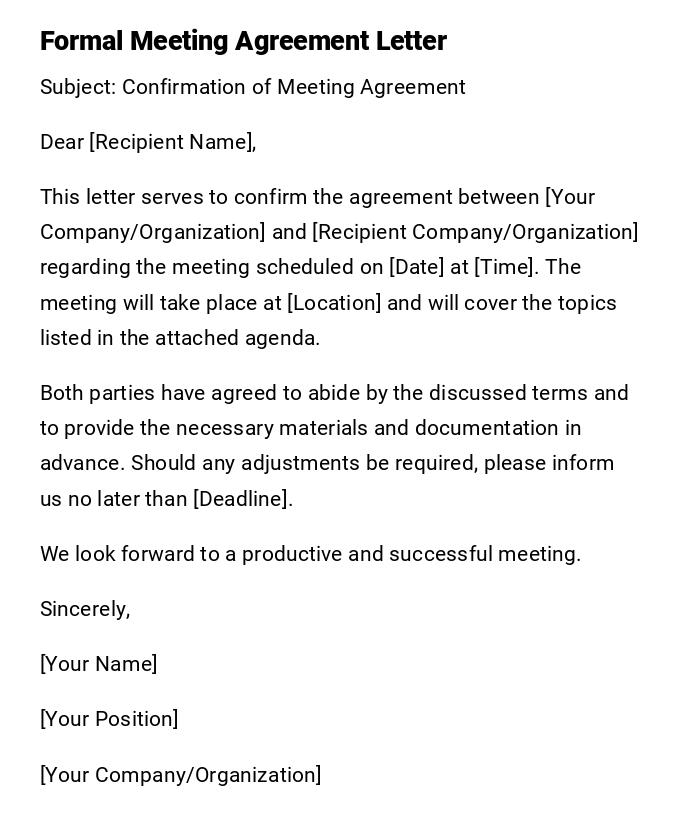
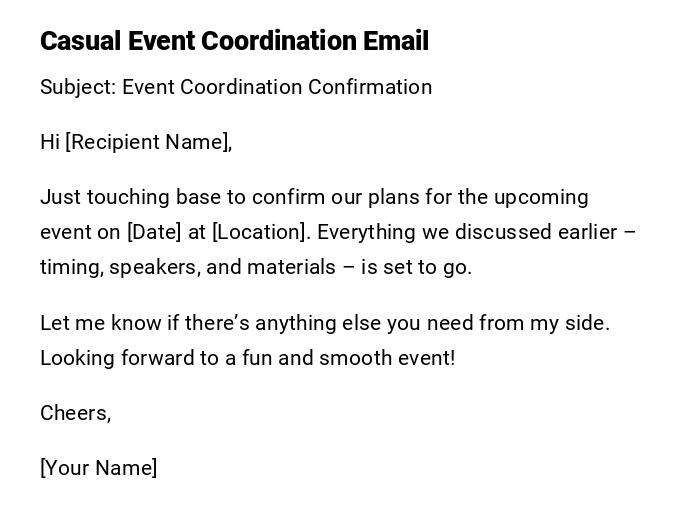
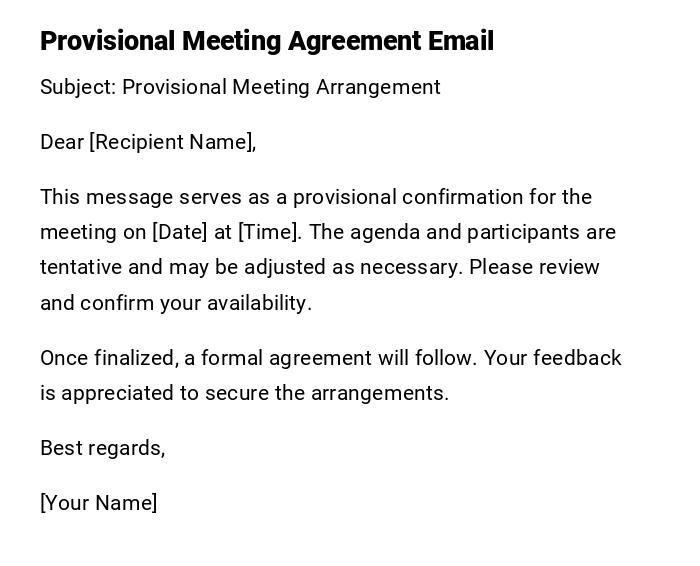
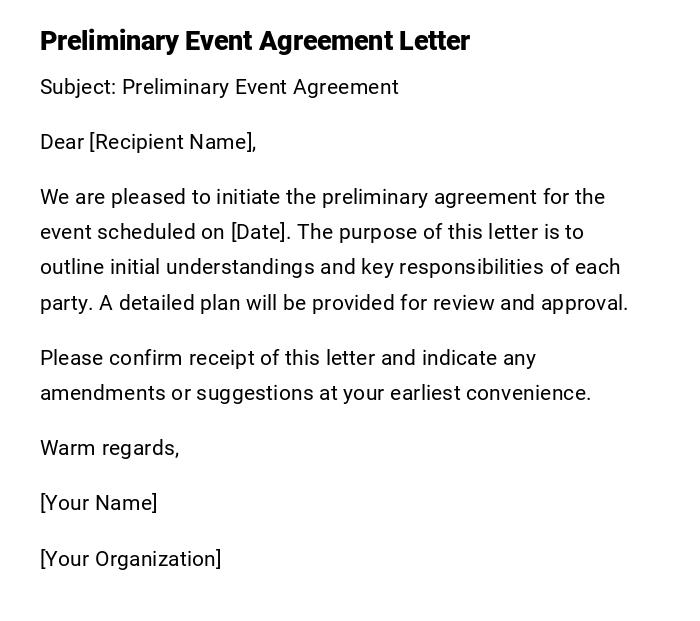
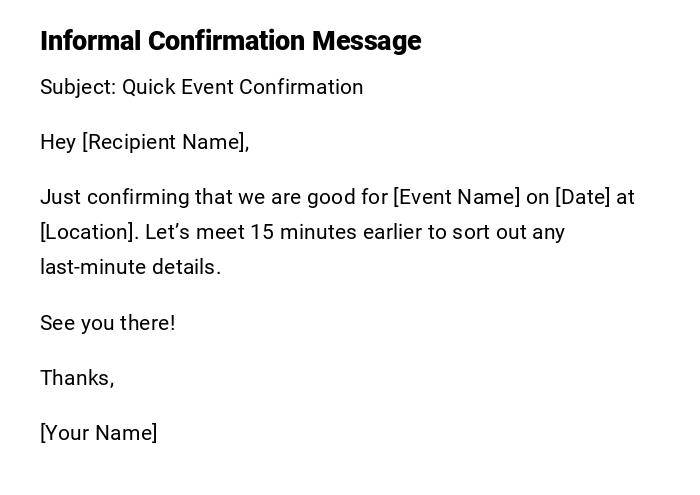
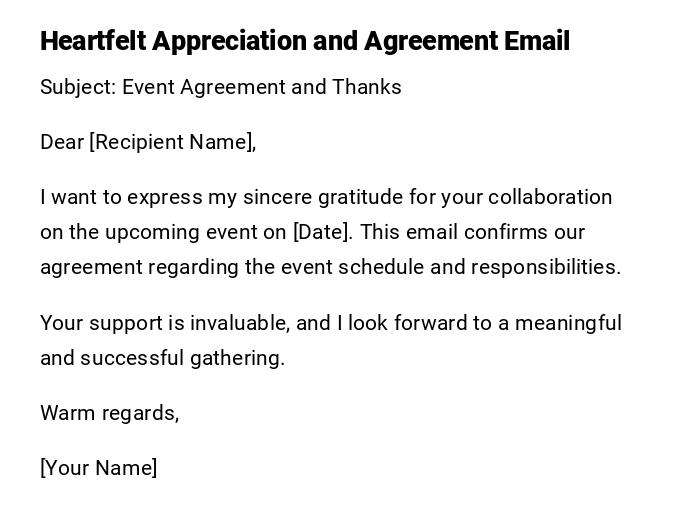

 Download Word Doc
Download Word Doc
 Download PDF
Download PDF